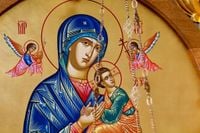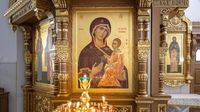Orthodox Christians around the world will celebrate the Annunciation of the Most Holy Theotokos on April 7, 2025, a significant event in the Christian calendar that marks the day when the Archangel Gabriel announced to the Virgin Mary that she would conceive the Son of God. This day, known for its spiritual significance, also heralds the arrival of spring, with many traditions and omens linked to agricultural preparations.
The Annunciation is one of the twelve major Orthodox holidays, celebrated as a time of joy and reflection. According to Holy Scripture, it was on this day that Gabriel delivered the miraculous news to Mary, proclaiming, "Rejoice, Blessed One! The Lord is with you! Blessed are you among women!" This announcement is considered the first 'good news' after the fall of Adam and Eve, marking the beginning of humanity's path to salvation.
Historically, the celebration of the Annunciation dates back to the 3rd century AD, with the date being fixed in the 6th century as March 25 in the Julian calendar. For Orthodox Christians, this translates to April 7 on the Gregorian calendar. The holiday is always celebrated exactly nine months before Christmas, emphasizing its significance in the Christian narrative of the Incarnation.
Interestingly, in 2025, the Annunciation coincides with the end of a challenging astrological phenomenon known as retrograde Mercury, adding an intriguing layer to the day. From April 7 to January 7, there are exactly 275 days, highlighting the miraculous timing of Jesus' birth, as He spent approximately 9.04 months in His mother’s womb.
In many Orthodox traditions, the clergy don blue vestments during the Annunciation service, symbolizing purity and the Virgin Mary. The day is marked by special prayers and rituals, including the release of white doves, which represent the good news brought by Gabriel and the freedom granted to humanity through the incarnation of Christ. In Moscow, this ceremony often involves children and the Patriarch of Moscow, Kirill, further embedding the day in community and family traditions.
As the Annunciation approaches, many people engage in prayers at icons depicting the Mother of God with the Archangel Gabriel. The prayers offered on this day are believed to hold special power, with many seeking blessings for family happiness, health, and well-being. Women often pray for assistance in conceiving and for harmonious family relationships, while young girls may ask for a suitable partner to build a family.
The cultural significance of the Annunciation extends beyond its religious context. In folk tradition, the day has long been associated with agricultural omens, reflecting the deep connection between spirituality and the cycles of nature. Observations made on the Annunciation are thought to predict the weather for the summer and the future harvest. For example, a bright sunny day on this holiday is believed to forecast a warm summer and a bountiful grain harvest, while rain is seen as a sign of a fruitful mushroom season.
In rural communities, various customs have evolved around the Annunciation, including the singing of springtime songs to welcome the season. Many believe that if one sees a swallow on this day, it signifies an early and warm spring, while active nesting by birds suggests a favorable agricultural year ahead. Furthermore, it is said that if one releases a bird into the wild on the Annunciation, it will bring good luck for the entire year.
Despite its joyous nature, the Annunciation also comes with certain restrictions, particularly as it falls during Great Lent. Traditionally, believers are allowed to consume fish, vegetable oil, and wine in moderation on this day, although strict fasting is observed if the holiday coincides with Good Friday or Holy Thursday.
On the Annunciation, engaging in heavy physical labor is discouraged, and many customs advise against activities such as sewing, cutting hair, or gardening. It is also considered inappropriate to quarrel or lend money, reinforcing the day's focus on peace and spiritual reflection.
The Annunciation is a reminder of the profound joy and significance of the Virgin Mary's acceptance of God's will, as she famously responded to Gabriel, "Behold, the Servant of the Lord; let it be to me according to your word." This act of faith is celebrated as the moment of conception, making the Annunciation a pivotal point in the Christian story.
As the day approaches, many Orthodox Christians prepare for this holy occasion by reflecting on its meaning and participating in community and church activities. It is a time to gather with family, share in the joy of the season, and engage in spiritual practices that reinforce the bonds of faith and community.
In conclusion, the Annunciation of the Most Holy Theotokos is not just a religious observance; it is a celebration of hope, renewal, and the promise of spring. As believers gather to commemorate this day, they do so with a sense of anticipation for the blessings that lie ahead, both spiritually and in the natural world.






